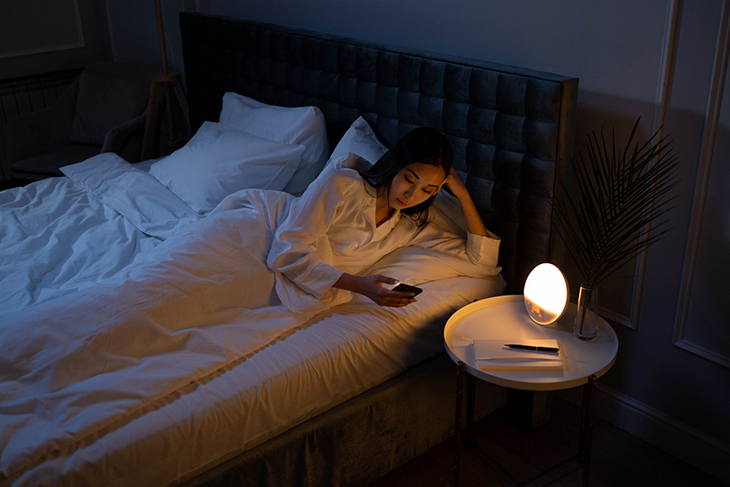
Results from a large new study that was presented at the annual meeting of the American College of Cardiology showed that people with insomnia are 69 percent more likely to have a heart attack than those who don’t have frequent sleep difficulties. In fact, the analysis highlighted that people that only sleep an average of five hours or less per night are at the greatest risk of cardiac crisis.
Lead study author and medical student at Alexandria University in Alexandria, Egypt, Yomna E. Dean, said, “Our results have shown that sleep deprivation is associated with a higher risk of heart attacks — the more sleep deprived, the higher the risk we face. We need to prioritize sleep in our lives to maintain a healthy heart.”
The benefits that come from a good night’s rest have been established for years and a number of studies show exactly that. Just last year, the American Heart Association (AHA) even added “good sleep” to its cardiovascular health checklist. Moreover, the organization suggests that adults should get between seven to nine hours of sleep every night for optimal cardiovascular health. According to the AHA, better sleep hygiene even helps manage health factors, such as weight, blood pressure, and the risk of type 2 diabetes.
‘Just Right’ Amount of Sleep
During the study, which was published in the Journal of Clinical Cardiology, Dean and her colleagues looked at nine previous studies that involved over one million adults from all around the globe. From this population, around 13 percent were identified to have insomnia, either via medical code or by the presence of particular symptoms. The symptoms include difficulty falling asleep, difficulty staying asleep or waking early, or not being able to go back to sleep.
The study participants were tracked over an average of nine years and had an average age of 52. About 43 percent were women and most of the participants – 96 precent – did not have a history of heart attack before.
The study findings also discovered that individuals who claimed to sleep an average of five or fewer hours per night were ‘1.8 times more likely to experience a heart attack with those who sleep six hours a night.’ Meanwhile, compared to those who slept seven to eight hours, participants who slept five hours or less ‘faced 1.56 times greater odds of having a heart attack.’
Insomnia More Dangerous For Those With Chronic Conditions
Some additional risk factors compounded the risk of heart attack when it comes to poor sleep. Dean expounds, “Not surprisingly, people with insomnia who also had high blood pressure, cholesterol [issues], or diabetes had an even higher risk of having a heart attack than those who didn’t. People with diabetes who also have insomnia had a twofold likelihood of having a heart attack.”
In addition, the study authors shared that insomniacs were more likely to suffer from a heart attack regardless of their age.
Too Much Sleep Isn’t Good For the Heart Either
While too little sleep isn’t good for you, too much sleep is also dangerous for the heart. When comparing those who slept five hours or less with those who slept nine hours or more, the study team didn’t find any significant difference in the increased risk for a heart attack.
Dean explained, “It is important to educate patients about this, as some may assume that if sleep deprivation is harmful to the heart, then excessively long sleep durations could be beneficial. However, that isn’t true.”
More Women Are Affected By Insomnia Than Men

While the researchers claimed they were expecting similar incidences of heart attacks among men and women, the results showed that ‘men with insomnia had a 103 percent higher heart attack risk while women had a 124 percent higher risk.’
Generally, women are also more likely to have insomnia. According to the Office on Women’s Health, ‘More than 1 in 4 women in the United States experience insomnia, compared with fewer than 1 in 5 men.’
So Why Is Insomnia Bad For the Heart?
Although the analysis did not look into why insomnia can cause more heart issues, Dean does point to the evidence that indicates how sleep deprivation leads to elevated levels of the stress hormone, cortisol. This, in turn, speeds up atherosclerosis, which is the buildup of fats, cholesterol, and other substances found within the arteries.
However, a cardiologist with Stanford Health Care in California, Abha Khandelwal, MD, who wasn’t involved in the study, said, “When you are not getting enough restorative sleep, you mess up certain hormones in your body, like cortisol. It creates a certain type of stress response that can mess up your blood sugar processing, your blood pressure, your risk for abnormal heart rhythms — many things can be impacted. So if you make sure you’re getting adequate sleep, that can only help your heart health.”
Dr. Khandelwal also points out that this type of analysis is rather limited in the manner of how the findings were put together since they came from previous studies, as well as information and self-reported questionnaires regarding sleep habits.
Drugs Shouldn’t Be the First Choice to Address Insomnia
Furthermore, the research didn’t look at whether sleep medications may influence heart attack risk either. Dr. Khandelwal explained, “In general, however, some of the prescription sleep aids are not actually associated with good [cardiovascular] outcomes,” says Khandelwal. “In fact, there’s probably some outcomes showing increased heart disease risk with medications like Ambien (zolpidem), [per research].”
Despite not working together, both Dean and Khandelwal suggest that those that want to address their insomnia should first try out behavioral changes. The Centers for Disease Control and Prevention (CDC) even offers some tips like going to bed at the same time every night and getting up at the same time every morning. Also, avoid caffeine or alcohol before bed, and also being physically active throughout the day.
Dr. Khandelwal shares that she sometimes refers her patients to behavioral psychologists to help train them in good sleep habits.
Dean also shares, “Those who suffer from insomnia and can’t get enough sleep despite prioritizing proper sleep hygiene should seek medical advice and should be screened for risk factors for heart attack.”



